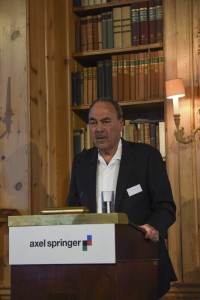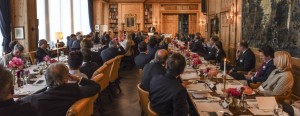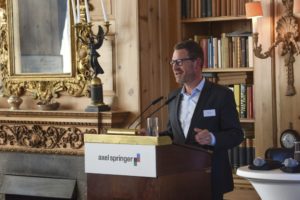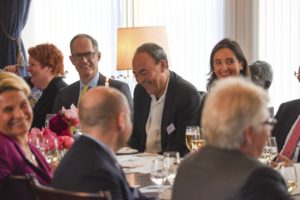
Germany seems to be doing just fine. The economy is growing nicely, exports are flourishing and unemployment is down. In fact, Germany is doing so well that it is the envy of most other European countries. Yet Silicon Valley investor Joe Schoendorf strongly believes that the writing is on the wall. Unless Germany’s culture changes radically, he warned, the country is unfit for the changes that the information revolution will bring.
“Germany is one of the great countries on earth. Business is great, and God bless the cheap Euro,” Schoendorf said at a United Europe dinner on May 6 in Berlin. “I have come here to say: it’s wonderful, but it isn’t always going to be like that. I have a deep, deep concern about Germany in particular and Europe in general.”
“We are moving from the industrialised world to an increasing dependence on the information economy,” Schoendorf continued. “I am very worried that you do not have the culture that will allow you to have the success in the information economy that you have had in the industrial economy.”
Creator or user
Schoendorf, a longtime partner in the venture capital firm Accel Partners, speaks from nearly 50 years’ experience in high technology industries in Silicon Valley. After stints at Hewlett Packard and Ungermann-Bass, he served as vice president of marketing for Apple Computer. “He knows them all, and he knows them all personally,” said United Europe’s Treasurer Jürgen Grossmann when he introduced his longtime friend Joe Schoendorf at the dinner event in Berlin.

More than 70 dinner guests – prominent business leaders as well as people from politics, think tanks and the media – had come to listen to Schoendorf’s speech “Watch it: Silicon Valley has only just begun”. In the beautiful wood-paneled rooms of the Axel Springer Journalists’ Club, the atmosphere was festive with great long tables decorated withflowers in a wild variety of reds.
Yet Schoendorf did not mince his words, and his audience came back with sharp questions, leading to a lively debate. “Germany, are you a creator of this new technology, or are you a user? My hard message tonight is that you are not a creator,” Schoendorf said.
Make new mistakes

The dinner was hosted by Kai Diekmann, editor of BILD, one of the driving forces behind the transformation of Axel Springer from a traditional publishing house to the digital age. In his welcoming speech, Diekmann recalled his first meeting with Schoendorf in Silicon Valley, “that crazy place where all the disruption is coming from.”
It was there that Schoendorf explained to him why Silicon Valley is so successful. “There was one cultural lesson that was particularly important: how you deal with failure,” Diekmann said. “In Silicon Valley, failure is a precondition for success. Fail, but fail fast.”
Germans, Schoendorf said in Berlin, have a completely different attitude towards failure, and it is this cultural difference that puts them at risk in the information age. “To invent the future, you need to understand the past. As Steve Jobs said, make new mistakes,” Schoendorf said. “We run a lot of experiments. We run hundreds, and you only hear about those that work. When we have a loser, we close the company.”
“I know disrupion to be an absolute fact”

To illustrate this cultural difference, Schoendorf described a meeting he had several years ago with German chancellor Merkel and her then deputy Franz Müntefering. When Schoendorf spoke about closing down companies that had failed, Müntefering was indignant. “You do not close companies in Germany!” he exclaimed.
Schoendorf’s point was clear: “In Silicon Valley you close the company on Friday, and most of those people have a new job on Monday,” he said. “Failure is not shameful; it is just the quickest way to learn a hard lesson.”
The information revolution will continue and it will disrupt both the traditional ways of doing business and the way that production is organised, Schoendorf said. “Believe in disruption. I know it to be an absolute fact”, he stressed. The next big industry that could expect to be disrupted was the financial industry.
The problem with smart computers
More worrying was the impact on the workforce. “We are going to take labour and replace it with intelligent machines. But what does labour then do? That’s the single most important question that our society is going to face.”

For the first time, it wasn’t just blue collar jobs at risk, Schoendorf explained. Computers now were able to learn instead of just doing what they had been programmed for. “The average IQ of human beings is 100. We are on course to develop machines that have equivalent “intelligence” and maybe even more,” the Silicon Valley investor said. “We’re now talking about replacing brain jobs.”
“Let in some fresh air”
Europe was wasting its time and money suing Silicon Valley’s best companies, Schoendorf said, referring to the EU Commission’s competition case against Google. “You are off to sue yesterday’s companies while we are building new ones. What you should do is beat them in the market place. Put the money into research and development, not into Brussels and the legal system.”

Not everybody agreed with everything that Joe Schoendorf said. But after two hours of lively discussion, everybody agreed that the points he had raised were very much worth thinking about. “We should let in a bit more fresh air,” United Europe’s President Wolfgang Schüssel said in his conclusion. “Accept change, accept failure – that’s what we take from this meeting.”
Fotos: Daniel Biskup, BILD
Press review:
7.5.2015 “Deutschland nicht bereit für digitale Revolution” in BILD


